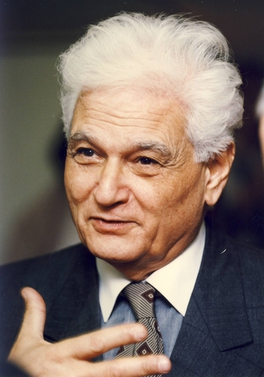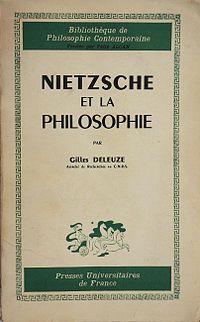Deconstruction is a loosely-defined set of approaches to understanding the relationship between text and meaning. The concept of deconstruction was introduced by the philosopher Jacques Derrida, who described it as a turn away from Platonism's ideas of "true" forms and essences which are valued above appearances.

Gilles Louis René Deleuze was a French philosopher who, from the early 1950s until his death in 1995, wrote on philosophy, literature, film, and fine art. His most popular works were the two volumes of Capitalism and Schizophrenia: Anti-Oedipus (1972) and A Thousand Plateaus (1980), both co-written with psychoanalyst Félix Guattari. His metaphysical treatise Difference and Repetition (1968) is considered by many scholars to be his magnum opus.

Jacques Derrida was an Algerian-born French philosopher. He developed the philosophy of deconstruction, which he utilized in a number of his texts, and which was developed through close readings of the linguistics of Ferdinand de Saussure and Husserlian and Heideggerian phenomenology. He is one of the major figures associated with post-structuralism and postmodern philosophy although he distanced himself from post-structuralism and disowned the word "postmodernity".

Richard McKay Rorty was an American philosopher. Educated at the University of Chicago and Yale University, he had strong interests and training in both the history of philosophy and in contemporary analytic philosophy. Rorty's academic career included appointments as the Stuart Professor of Philosophy at Princeton University, Kenan Professor of Humanities at the University of Virginia, and Professor of Comparative literature at Stanford University. Among his most influential books are Philosophy and the Mirror of Nature (1979), Consequences of Pragmatism (1982), and Contingency, Irony, and Solidarity (1989).

Being and Time is the 1927 magnum opus of German philosopher Martin Heidegger and a key document of existentialism. Being and Time had a notable impact on subsequent philosophy, literary theory and many other fields. Though controversial, its stature in intellectual history has been compared with works by Kant and Hegel. The book attempts to revive ontology through an analysis of Dasein, or "being-in-the-world." It is also noted for an array of neologisms and complex language, as well as an extended treatment of "authenticity" as a means to grasp and confront the unique and finite possibilities of the individual.

In the fields of philosophy, the terms obscurantism and obscurationism identify and describe the anti-intellectual practices of deliberately presenting information in an abstruse and imprecise manner that limits further inquiry and understanding of a subject. The two historical and intellectual denotations of obscurantism are: (1) the deliberate restriction of knowledge — opposition to the dissemination of knowledge; and (2) deliberate obscurity — a recondite style of writing characterized by deliberate vagueness.
Anti-foundationalism is any philosophy which rejects a foundationalist approach. An anti-foundationalist is one who does not believe that there is some fundamental belief or principle which is the basic ground or foundation of inquiry and knowledge.
Neopragmatism, sometimes called post-Deweyan pragmatism, linguistic pragmatism, or analytic pragmatism, is the philosophical tradition that infers that the meaning of words is a result of how they are used, rather than the objects they represent.

In social theory and philosophy, antihumanism or anti-humanism is a theory that is critical of traditional humanism, traditional ideas about humanity and the human condition. Central to antihumanism is the view that philosophical anthropology and its concepts of "human nature", "man" or "humanity" should be rejected as historically relative, ideological or metaphysical.

"The Origin of the Work of Art" is an essay by the German philosopher Martin Heidegger. Heidegger drafted the text between 1935 and 1937, reworking it for publication in 1950 and again in 1960. Heidegger based his essay on a series of lectures he had previously delivered in Zurich and Frankfurt during the 1930s, first on the essence of the work of art and then on the question of the meaning of a "thing", marking the philosopher's first lectures on the notion of art.
Robert Buford Pippin is an American philosopher. He is the Evelyn Stefansson Nef Distinguished Service Professor in the John U. Nef Committee on Social Thought, the Department of Philosophy, and the College at the University of Chicago.
Ontotheology means the ontology of God and/or the theology of being. While the term was first used by Immanuel Kant, it has only come into broader philosophical parlance with the significance it took for Martin Heidegger's later thought. While, for Heidegger, the term is used to critique the whole tradition of 'Western metaphysics', much recent scholarship has sought to question whether 'ontotheology' developed at a certain point in the metaphysical tradition, with many seeking to equate the development of 'ontotheological' thinking with the development of modernity, and Duns Scotus often being cited as the first 'ontotheologian'.
Ironism is a term coined by Richard Rorty, for the concept that allows rhetorical scholars to actively participate in political practices. It is described as a modernist literary intellectual's project of fashioning the best possible self through continual redescription. With this concept, Rorty argues for a contingency that rejects necessity and universality in relation to the ideas of language, self, and community.
David Farrell Krell, is an American philosopher. He is professor emeritus of philosophy at DePaul University. He received his Ph.D. in philosophy at Duquesne University, where he wrote his dissertation on Heidegger and Nietzsche. He has taught at many universities in Germany, France, and England. Specializing in Continental Philosophy, he has written many books on Heidegger and Nietzsche, including Daimon Life: Heidegger and Life Philosophy (1992), Intimations of Mortality: Time, Truth, and Finitude in Heidegger's Thinking of Being (1986), The Good European: Nietzsche's Work Sites in Word and Image (1997), and Infectious Nietzsche (1996). Additionally, Krell has written extensively about German Idealism, his books in this area include The Tragic Absolute: German Idealism and the Languishing of God (2005), and Contagion: Sexuality, Disease, and Death in German Idealism and Romanticism. Krell has also translated Heidegger's lectures on Nietzsche, and was the editor of Heidegger's Basic Writings (1977). In a 2005 interview, Krell cited Jacques Derrida as a major influence on his work on Nietzsche.
Trace is one of the most important concepts in Derridian deconstruction. In the 1960s, Jacques Derrida used this concept in two of his early books, namely Writing and Difference and Of Grammatology.
In the philosophy of religion and theology, post-monotheism is a term covering a range of different meanings that nonetheless share concern for the status of faith and religious experience in the modern or post-modern era. There is no one originator for the term. Rather, it has independently appeared in the writings of several intellectuals on the Internet and in print. Its most notable use has been in the poetry of Arab Israeli author Nidaa Khoury, and as a label for a "new sensibility" or theological approach proposed by the Islamic historian Christopher Schwartz.

Lolita is a 1955 novel written by Russian-American novelist Vladimir Nabokov that addresses the controversial subject of hebephilia. The protagonist is a French literature professor who moves to New England and writes under the pseudonym Humbert Humbert. He describes his obsession with a 12-year-old "nymphet", Dolores Haze, whom he kidnaps and sexually abuses after becoming her stepfather. Privately, he calls her "Lolita", the Spanish nickname for Dolores. The novel was originally written in English, but fear of censorship in the U.S. and Britain led to it being first published in Paris, France, in 1955 by Olympia Press.

Nietzsche and Philosophy is a 1962 book about Friedrich Nietzsche by the philosopher Gilles Deleuze, in which the author treats Nietzsche as a systematically coherent philosopher, discussing concepts such as the will to power and the eternal return. Nietzsche and Philosophy is a celebrated and influential work. Its publication has been seen as a significant turning-point in French philosophy, which had previously given little consideration to Nietzsche as a serious philosopher.

Irony, in its broadest sense, is the juxtaposition of what on the surface appears to be the case and what is actually the case or to be expected. It typically figures as a rhetorical device and literary technique. In some philosophical contexts, however, it takes on a larger significance as an entire way of life.
John Llewelyn was a Welsh-born British philosopher whose extensive body of work, published over a period of more than forty years, spans the divide between Analytical and Continental schools of contemporary thought. He has conjoined the rigorous approach to matters of meaning and logic typical of the former and the depth and range of reference typical of the latter in a constructive and critical engagement with the work of Jacques Derrida and Emmanuel Levinas.










